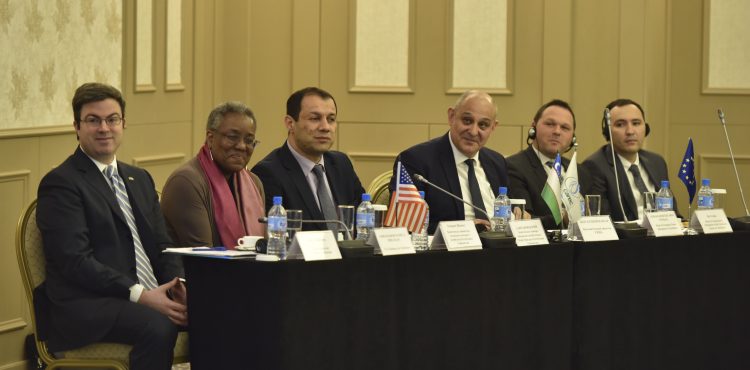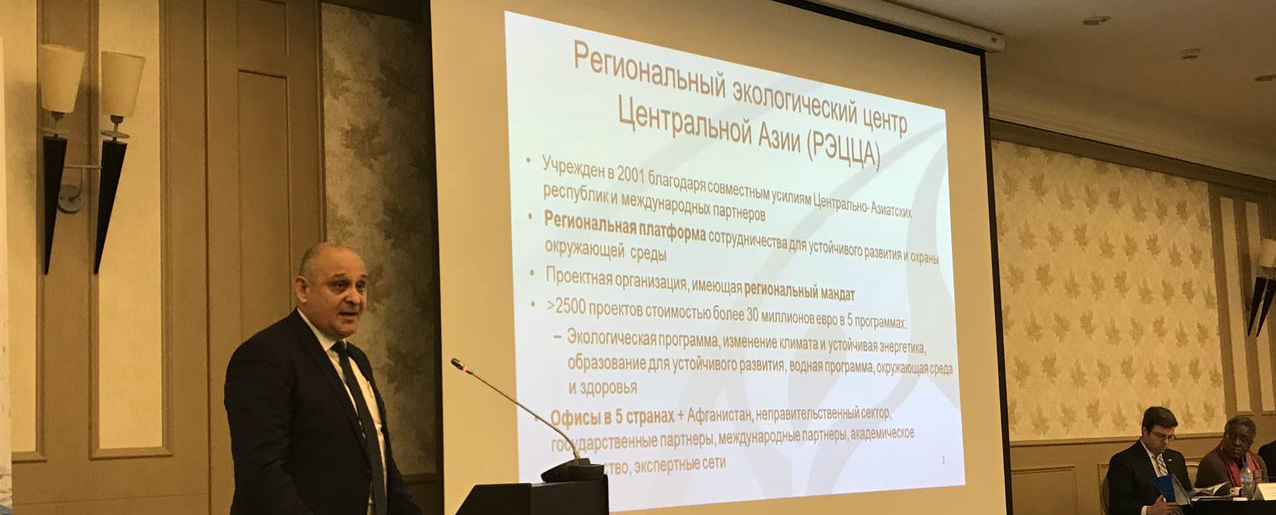Presentation of CAREC initiatives to improve water resources management in Uzbekistan
On April 17th, 2017, CAREC held a seminar on "Initiatives to improve water resources management" in Tashkent. The Open Day and press briefing of the CAREC Office in Uzbekistan were also held within the framework of the event.

_______________
The main purpose of the meeting was a comprehensive discussion about the upcoming work and the work done by CAREC, plans of projects on environmental protection and sustainable development in particular on management of water resources in the Republic of Uzbekistan and Central Asia.
The deputies of the Oliy Majlis, the representatives of different environmental and water resources management organizations, higher educational institutions, the media as well as a number of international partners took part in the seminar.
Greetings were made by the Deputy Speaker of the Legislative Chamber of the Oliy Majlis of the Republic of Uzbekistan - Mr. Boriy Alikhanov, the Ambassador of the United States of America to the Republic of Uzbekistan - Ms. Pamela Spratlen, the Head of the EU Delegation to Uzbekistan, Ambassador - Mr. Eduard Stiprais, the Deputy Chief of the Main Administration of Water Resources of the Ministry of Agriculture and Water Resources of the Republic of Uzbekistan – Mr. Ravshan Mamutov and by the Head of the Main Department of Water and Land Resources Control of the State Committee for Nature Protection of the Republic of Uzbekistan – Mr. Maksud Abbaskhanov.
“I am confident that together, we will improve the water management system to transfer the management of natural resources to the future generation in Central Asia,” said the U.S. Ambassador, Ms. Pamela Spratlen.
“Rational use of water is closely associated with such issues as capacity building, application of innovative methods for water resources management and raising the environmental awareness of the population," said Mr. Eduards Stiprais, Head of the European Union Delegation to Uzbekistan, “Uzbekistan's work in this area, including the introduction of drip irrigation, gives its positive results.”
During the event following tasks for the water sector were discussed: universal application of water-saving technologies; stable financing; improvement of the technical condition of irrigation networks and reservoirs; and in general, the water management structure; raising awareness, the application of advanced world experience in all directions. Moreover, participants discussed the below mentioned CAREC initiatives to address these problems:
The project "Water, education and cooperation in Central Asia" (“Smart Waters”), funded by the United States Agency for International Development (USAID).
The project "Water Cooperation in Central Asia", funded by the European Union.
The project "Raising awareness and partnership for sustainable water and environment development in Uzbekistan”, Component 3, of the European Union program "Sustainable Management of Water Resources in Rural Areas of Uzbekistan" funded by European Union.
The project "Provision of science based evidence on climate induced water quality challenges in Amu Darya basin", funded by the United States Agency for International Development (USAID).

_______________
Analyzing the results of CAREC activities in the country to date, the partners particularly emphasized the restoration of the eco-balance at Lake Sudochye in Muynak district of Karakalpakstan, as a result of which about 7,000 flamingos have returned and continue to nest.
The work was done within the framework of "Protection and rational use of wetlands Sudochye lake system on the Ustyurt plateau" project, it is a part of a bigger project "Stakeholder Partnership in joint development policies: Promoting cross-border cooperation on small watersheds in Central Asia" funded by the USAID.
According to Dr. Iskandar Abdullaev, Executive Director of CAREC, the solutions for environmental problems require systematic approach. Journalists, in turn, noted the importance of building up stable relations and providing a continuous flow of information about the projects that are being implemented.
